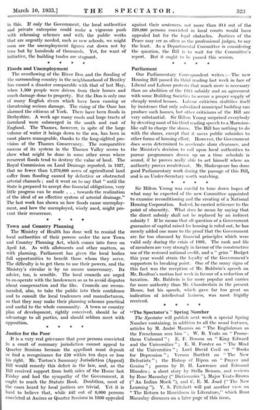Floods and Unemployment The overflowing of the River Don and
the flooding of the surrounding country in the neighbourhood of Bentley has caused a disaster comparable with that of last May, when 1,500 people were driven from their homes and much damage done to property. But the Don is only one of many English rivers which have been causing or threatening serious damage. The rising of the Ouse has alarmed the citizens of York. There have been floods in Derbyshire. A week ago many roads and large tracts of farmland were submerged in the south and east of England. The Thames, however, in spite of the large volume of water it brings down to the sea, has been in most places manageable, thanks to the long-sighted pro- vision of the Thames Conservancy. The comparative success of its system in the Thames Valley seems to show what might be done in some other areas where recurrent floods tend to destroy the value of land. The Royal Commission on Land Drainage reported, in 1927, that no fewer than 1,279,000 acres of agricultural land suffer from flooding caused by defective or obstructed arterial channels ; and it went on to say that " until the State is prepared to accept due financial obligations, very little progress can be made . . . towards the realization of the ideal of an effective system of arterial drainage." The last week has shown us how floods cause unemploy- ment, and how the unemployed, wisely used, might pre- vent their recurrence.
• * * *






































 Previous page
Previous page